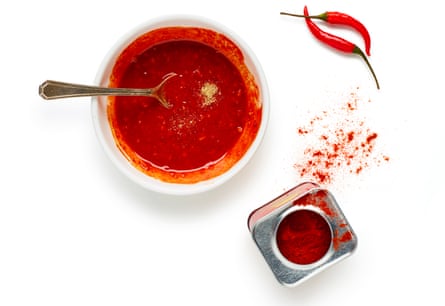How to cook the perfect piri piri chicken – recipe | Chicken

A Portuguese dish with roots in Angola and Mozambique, popularized in the UK by a Johannesburg-based restaurant chain, chicken piri piri may have a complicated past, but its present is crystal clear: we love it. That “brash” chain, Nando’s, has been described as “one of the most successful cults in Britain”, having carved out an unlikely, but undeniable, niche for itself in our national identity. In perhaps the latest sign of its success, piri piri has now also been added to the list of dubious attractions at my local Texas fried chicken shop. It seems we can’t get enough of Spicy Grilled Chicken.
- Cocktail of the Week: Hush Hot Dog – Recipe | cocktails
- How to turn fish cheeks into a festive skewer | Food
- Britney Spears Reflects on Madonna Kiss — and Her Mentorship in ‘The Woman in Me’
- Pack a Punch: Chetna Makan’s Christmas Chutney Gifts – Recipes | Food
- How to make the perfect spanakopita | Food
Popularity, however, breeds scorn, and even animal welfare issues aside, not all of this piri piri has the vibrancy and vinegar of the sizzling, salty stuff stuffed down the hatch of your average kiosk or steakhouse. Lisbon. Fortunately, however, if you can grill chicken, you can make much better piri piri chicken at home.
You are watching: How to cook the perfect piri piri chicken – recipe | Chicken
peppers
The name piri piri comes from the variety of chile used, a cultivar of Capsicum frutescens, which also includes tabasco chiles, probably brought by the Portuguese from their colonies in South America to Africa and from there to Europe. In Swahili, pili pili apparently means pepper, prompting the occurrence of “the chili so hot they named it twice,” and it lives up to that reputation. The fruit registers between 50,000 and 175,000 Scoville units (measured based on the amount of sugar water needed to neutralize its fire), which qualifies it for the “very hot” category in Kay Plunkett-Hogge’s book Heat, one below of pure capsaicin (16 million units, and “explosive!”).
The problem I’m having is that despite dragging the dog through several Portuguese neighborhoods in London, I can’t find any fresh or even dried piri piri chillies: the fishmonger said he stocks them every once in a while, according to the lovely assistant at the El Tastes of Portugal cafe in Lambeth is closed for holidays. The African strongholds of Rye Lane in Peckham and Ridley Road Market in Hackney also don’t deliver, though the latter produces some I can’t confirm as an African bird’s-eye view: the stall owner is smiling but mute. South Devon Chilli Farm, which sells them online for a few months of the year, also doesn’t have them in stock at the time of writing. This problem has been clearly anticipated by the writers of the recipes I try. Only Rebecca Seal’s Lisboa calls for fresh piri piri chiles. Rick Stein specifies dry in his book Long Weekends, suggesting red jalapeño and bird’s eye as the backing. Catherine Phipps recommends scotch bonnets at Chicken, Nuno Mendes a long red chili at Lisboeta, and Diana Henry just plain red chiles at A Bird in the Hand.
However, piri piri, while hot, doesn’t have a particularly distinctive flavor if the dried fruit you buy is anything to go by, thus Plunkett-Hogge’s recommendation to substitute equally hot Thai bird’s-eye chilies ( 50,000-100,000 Scoville), readily available seems like a good one. That said, since it’s the heat that matters, as long as you stick to ripe red chiles, you can use just about any hot variety you like. Add them to taste, as Seal suggests, keeping in mind that “the heat of the pasta will weaken as it cooks, so go for a little more heat than you think you’d like.”
Seal’s recipe also includes red bell peppers, presumably for both color and flavor, giving his piri piri a pleasant sweetness that suits testers well as a sauce, but lacks the fire of some of the others. versions. Again, that’s not necessarily a problem: According to Taste of Lisboa food tours: “We don’t even really like spicy food. Yes, there is the possibility of ordering grilled chicken with hot sauce, but most people do not ask for the sauce and prefer to accompany the chicken with French fries. In the UK, of course, we like both.
Even more popular than red bell pepper, however, is the brick-red paprika used by Tessa Kiros in her book Piri Piri Starfish, and by Stein and Phipps, whose choice of sweet and smoky is particularly useful if weather conditions preclude grilling the meat. . Those sticking to a milder variety of fresh chili might prefer the hot one instead – it’s up to you.
Other scents
This is a spicy dish, rather than grassy. My testers don’t think the oregano used by Henry, Phipps, Stein, and Kiros adds much once the heat rises, and the same goes for Kiros’s bay leaf. Both would be lost in my fiery sauce, but may be more welcome in milder versions.
Similarly, the bold flavor of garlic is preferred over Phipps’ milder sautéed onion, but then, his sauce, based on South African chef Grant Hawthorne’s African Volcano range, is a beast quite different from the rest: a smoky, tomato , almost chutney. -Subject that ends with a real kick. Hawthorne tells me that his recipe is based on one from Beira in Mozambique, helpfully adding that West African versions use cumin and ginger, while Portuguese ex-colonies often include vinho verde and citrus for a more intense flavor. Testers love it as a side, but we all find that its complex flavors get a little lost in the cooking process, while simpler, sour, and spicy marinades like Mendes’s still shine brighter than ever.
the acid test
Sharpness is one of the key qualities in most piri piri sauces, usually added in the form of lemon juice or wine vinegar. I prefer the cleaner flavor of the first, but either will do, and you can also add a bit of balancing sweetness to it. , in the form of sugar, as Henry, Phipps and Stein do, or port, as Kiros does. The latter seems pleasantly apt to me, but only if you have an open bottle: it doesn’t make enough of a difference to warrant a special purchase, unless you’re looking for an excuse, of course.
Mendes adds a whole lemon to his piri piri paste, giving it a very distinctive, though not unpleasant, bitter taste that completely overpowers the chili. Interesting, but not as universally popular as the fries he suggests as a side.
The chicken
In Portugal, whole spatchcocked chickens are popular, but they tend to be smaller than those easily found in the UK (Kiros asks for 800g birds – the closest I can find is 1.2kg). Since meatier breasts tend to dry out on high heat, I’m going to go for Seal’s whole legs, though Stein’s big thighs are every bit as delicious as you could have imagined in your most secret dreams, and the wings, I don’t know. Don’t try it, it would be perfect for a party situation.
the marinade
Seal and Phipps marinate their chicken overnight in piri piri, Mendes leaving it for two hours, Kiros adding the sauce to the chicken during the last few minutes of cooking, and Stein not adding it until the meat is completely off the heat. Stein’s method has the advantage of keeping the skin super-crispy, but it lacks the charred chili flavor of the others. Kiros’s method feels like the best compromise: long enough to burn a little, short enough to keep the flavors fresh.
Like Stein, he first marinates the meat in lemon juice, garlic and salt, as would be traditional in a Portuguese steakhouse I think. This gives it an addictive flavor with no risk of it burning on the grill, apart from a few specks of garlic. However, Harold McGee has written that he doesn’t make sense to leave it in this acid bath for more than two hours, telling the LA Times: “Any longer than that, and the meat will have some kind of floury substance on the surface. The structured tissue of the meat is turned into tiny protein particles (ok for a pâté, but not what you want in a steak) or, indeed, grilled chicken.
Mendes and Kiros use copious amounts of butter in their sauce, which adds richness to the finished dish, but also tempers the heat. This leads me to use olive oil instead, although you may prefer to go their way. Some recipes also include whiskey or brandy for preservation purposes, but unless you plan to keep the sauce for a while, it doesn’t add much to the flavor.
cooking method
The barbecue is ideal for this purpose, but excellent results can also be obtained in the oven, as Stein recommends. I prefer to finish them on a hot griddle rather than under the broiler, which I find messy and more work to clean up.
Perfect piri piri chicken
Serve with chips and lemon wedges if you want to go Portuguese, although it’s also very nice with rice to soak up the extra sauce. Or, à la Mendes, freshly fried potato chips – I have it on good authority that a bag from the supermarket works too.
Homework 15 min, plus marinade
Cook 40 minutes
It serves 4
4 chicken thighs (thigh and thigh), with skin on, with bone
for the marinade
Juice of ½ lemon
4 garlic clovespeeled and shredded
2 teaspoons salt flakes
See more : Is it possible to change the sex of a chicken before it is born? | Eggs
For the piri piri sauce
2-4 red African or Thai bird’s eye chiliesprove
2 thick garlic clovesbare
juice of 1 lemon
1½ teaspoons salt flakes
2 teaspoons smoked sweet paprika
50ml olive oil
1 tablespoon port or 1 teaspoon brown sugar (optional)
 The marinade is a simple mixture of lemon juice, garlic, and salt that is first rubbed into the chicken. Photograph: Dan Matthews/The Guardian
The marinade is a simple mixture of lemon juice, garlic, and salt that is first rubbed into the chicken. Photograph: Dan Matthews/The Guardian
Whisk together the lemon juice and garlic for the marinade. Place the chicken in a roasting pan large enough to hold it and spoon the garlic juice all over, turning to make sure it is well coated. Sprinkle with the salt, cover, and leave at room temperature (unless it’s a very hot day) for an hour.
 Make sure the chicken is well coated with the garlic juice. Photograph: Dan Matthews/The Guardian
Make sure the chicken is well coated with the garlic juice. Photograph: Dan Matthews/The Guardian
Meanwhile, chop two chillies (gloves are recommended) and the garlic, add the lemon juice and salt, and blend until smooth (or pound well in a mortar). Beat paprika and oil. Taste, adding more chili pepper if you think it needs it, and the port or sugar if you prefer it a little sweeter.
 To make the piri piri sauce, mix chiles, garlic, lime, and salt, then add smoked paprika. Photograph: Dan Matthews/The Guardian
To make the piri piri sauce, mix chiles, garlic, lime, and salt, then add smoked paprika. Photograph: Dan Matthews/The Guardian
Prepare the barbecue, if you use it. Once at cooking temperature, grill the chicken for 35 minutes with the lid on, then check. If almost done, brush with piri piri and cook, uncovered, for another 10 minutes, until cooked through.
Alternatively, heat the oven to 200C/390F/gas 6 and roast the chicken for about 35 minutes, until cooked through, basting with its juices from time to time. Heat a skillet over medium heat, brush the chicken with piri piri, and grill for a few minutes on each side, until just beginning to char.
Either way, serve hot with the extra sauce on the side.
Piri Piri Chicken – Do you prefer the Portuguese version or the African originals, and does Nando’s make a decent fist? If not, where else would you recommend? And the piri piri prawns are delicious, but what else is delicious with this spicy sauce?
Source: https://cupstograms.net
Category: Uncategorized